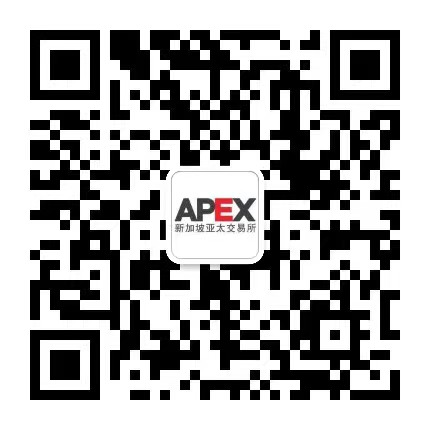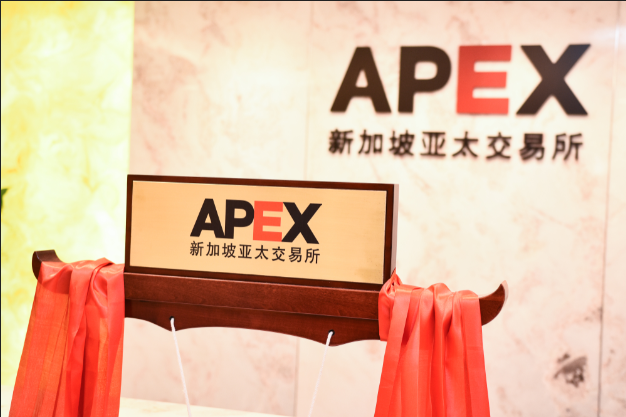
by APEX News | 2018-06-20

来源:人民网-人民日报 记者:谢卫群
5月25日,精炼棕榈油期货合约平稳推出,这是新加坡亚太交易所第一个交易品种,而这一交易所竟是中国企业创立的。
建立这一交易所的领头人正是朱玉辰。眼下,他是亚太交易所首席执行官。
朱玉辰是中国期货业的开拓者,先后担任了大连商品交易所总经理、中国金融期货交易所总经理。创立亚太所之前,他还担任过浦发银行行长。
他为何要出走新加坡,并在那里建立期货交易所呢?记者专访了朱玉辰。
“我有一个梦想:亚洲人能在白天参加主场交易”
2012年8月——2015年4月,朱玉辰接受组织安排,由中金所总经理之位,转任上海浦东发展银行行长。工作地点由浦东转到浦西,成为了上海地方干部。
浦发银行是中国第七大银行,在世界商业银行中排名前30名左右。当时,浦发银行有4万多人、4万多亿资产,在资产总量和团队规模上,都是中金所的100倍。
但,由银行转回期货,似乎又是一个必然。“我是空降行长,之前从未有过银行从业经历。在浦发做行长的近3年里,我发挥了跨业优势,干得很辛苦,干得也很充实,这段跨业经历大大丰富了我的金融阅历。但是,离开浦发银行后,我还是感觉期货是我的家园,交易所是我的心结。”
这就是朱玉辰再回期货市场的初衷。
朱玉辰谈到,“我们期货人都有一个共同的经历,就是长期晚上盯欧美盘交易,挑灯夜战到天明。20年下来,我们都是客场作战、隔山买牛,本来就不容易赚钱,即使赚了钱,长期熬夜,过着黑白颠倒的生活,身体也都垮了。期货人的梦想是有一天,我们有自己的国际主场,能在白天交易,欧美人半夜起床来盯我们的盘!让我们亚洲人能在白天交易,晚上睡个好觉,这就是我们APEX使命的最简单、最朴素的写照!”
新加坡与中国同属一个时区,这正是让欧美人盯我们的盘的时区。
正是带着全球定价体系必将重构的执着信念, 2016年新春刚过,朱玉辰就来到新加坡金融管理局敲门,提出了建设亚太交易所的构想。新加坡金融管理局经过详细论证和严格尽职调查,于2016年6月给了他筹备“绿灯”。经过近两年的艰苦而曲折的筹备,亚太交易所(APEX)终于在今年5月25日鸣锣开市。“仿佛一夜之间我又回到了20年前的大商所,又以粮油期货起步,蕉风椰雨踏上新的征程”,他感叹。
亚洲优势品种的定价权,应逐渐转移到亚洲
亚太交易所是继新加坡交易所、洲际交易所之后,新加坡的第三家交易所,也是朱玉辰人生之中打造的第三家交易所。交易所的股东全部由中国企业组成。
目前,亚太交易所具有交易和结算两张牌照,既可以做大宗商品期货,也可以上市金融衍生品。
在大宗商品方面,亚太交易所将选择东南亚最有优势的特色产品、新加坡贸易中转量最大的商品,以及中国、印度等国进口量最大的品种,包括能源、农产品、金属等。
在金融衍生品方面,亚太交易所将围绕股指、债券和人民币国际化相关的品种展开,探索汇率、利率、股票指数等金融衍生品交易,包括中国概念股指数衍生品、人民币兑美元的期货期权等。
朱玉辰谈到,目前,全球经济贸易重心正在从西向东转移,大宗商品的定价中心也应该从西方转移到东方。全球经济密码是“1114”:即全球70亿人口,10亿在美洲、10亿在欧洲、10亿在非洲、40亿在亚洲。亚洲已经成为全球最为活跃的经贸中心。
他说,中国是世界第二经济大国、世界第一贸易大国。中国的能源、农产品等大宗商品进口量世界第一,其中铁矿石、天然橡胶、大豆等超过全球进口量的一半以上。但是,定价权主要掌握在欧美老牌交易所手中,这个格局已经持续了100多年。如今属于亚洲的优势品种的定价权,应该随着现货贸易格局的转变,而逐渐转移到亚洲来,并充分展现中国的影响力。
朱玉辰说,亚太交易所的使命是打造大宗商品亚洲价格基准。亚太交易所将重点围绕亚太地区的产业特点和发展需求,用5年时间构建完整的大宗商品和金融衍生品产品线。
东南亚特色品种主要包括棕榈油、天然橡胶等,中国和印度进口量较大的品种主要包括原油、铁矿石、大豆等,而人民币相关的品种则主要围绕人民币国际化的方向展开。
未来,亚太交易所将立足新加坡、辐射亚太、面向全球,构建大宗商品和金融衍生品交易中心,打造亚洲价格基准,为亚太地区经贸发展提供一个新的风险管理平台,增强亚洲和中国的定价话语权。
作为一家国际期货交易所,亚太交易所的客户定位是国际化的,并不针对中国境内市场,而是覆盖东南亚、中东、欧美的客户和部分已经出海的中国企业。
亚太交易所的交易网络覆盖全球,交易和清算会员涵盖新加坡、中国香港、欧美等地主流的期货经纪商。交易规则按照国际规范制订,满足全球投资者的交易习惯。亚太交易所设独立的清算所(APEX Clear),按照国际规范建立了中央对手方担保制度。
亚太交易所是为中国期货市场国际化“打前站”
亚太交易所与国内的交易所会是怎样的关系?
朱玉辰以为,亚太交易所与国内交易所之间不是竞争关系,而是补充关系。近年来,上海证券交易所、深圳证券交易所、中国金融期货交易所都走出国门,与德意志交易所合资建立中欧国际交易所、参股巴基斯坦证券交易所。亚太交易所与他们的性质一样,也是中国期货市场走向国际的重要组成部分,充当中国期货市场国际化的试验田。
他说,亚太交易所通过设在成熟的国际贸易中心新加坡,直接开展国际期货交易。条件成熟后,部分品种将直接以人民币标价,以离岸方式服务在岸市场,助推人民币国际化。实际上,中国很多在境外从事大宗商品贸易的企业,长期活跃在欧美期货市场上。亚太交易所的诞生,为这些企业提供了新的选择,增添了一个新的发展机会。
亚太交易所是中国企业第一次走出国门创办交易所,是响应中国“一带一路”倡议的具体实践。在朱玉辰看来,交易所是重要的金融基础设施,是金融中心的标志性机构,其意义不亚于在东南亚修建一条新的铁路、公路等基础设施。而且,金融基础设施与交通基础设施异曲同工、相互呼应,可以为“一带一路”建设提供更丰富的内涵。
朱玉辰谈到,我们欣喜地看到,中国期货市场已经崛起,经过30年的发展,从大乱达到大治。无论是交易规模还是风险管理水平,中国期货市场无疑都是仅次于美国的世界第二大期货市场。
中国期货市场发展的上半场已经走完,下半场的主要任务是如何走向国际,如何提高国际定价能力,增强对国际规则制订的话语权,向国际市场传导中国的影响力,更需要把国内的成功变成一种国际的成功。
朱玉辰说,“我们很高兴地看到,原油、铁矿石期货开始对外开放,证监会领导也指出未来会有更多的期货品种实现国际化。假以时日,中国一定会成为全球大宗商品与金融衍生品交易中心。亚太交易所在这个过程中打好前站,配合好、呼应好、服务好中国期货市场走向国际。”
如今,作为期货界的一名老兵,朱玉辰看到中国期货市场发展壮大,并向国际市场释放中国能量、发出中国声音,倍感自豪!“我感觉现在睡觉都是在浪费时间,应该夙兴夜寐、开疆拓土,不知疲倦地奔跑在期货市场前沿阵地上,无愧于这个伟大的时代!”
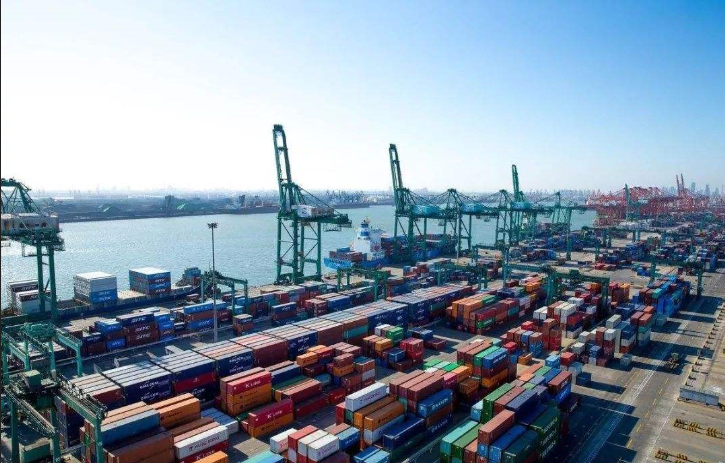
by APEX News | 2018-06-08

CNBC
Huileng Tan | @huileng_tan
Chinese exchanges are wooing international commodities traders in a bid to overtake longstanding benchmark prices — many of which are set in Europe and the U.S. — reflecting ambitious plans by the world’s second-largest economy to expand its influence overseas.
In the last few months, Chinese exchanges have opened up the trading of derivatives products for a few major commodities to international participants.
Those include crude oil futures on the Shanghai International Energy Exchange, iron ore futures on the Dalian Commodity Exchange and palm olein futures on the Asia Pacific Exchange (APEX), the last being a new largely Chinese-backed exchange based in Singapore. Palm olein is a widely traded palm oil compound used in cooking and baking.
“Right now, China’s market is more like a domestic market. We are [now] going out to internationalize China’s futures market,” said Eugene Zhu, CEO of APEX.
CNBC
Huileng Tan | @huileng_tan
Chinese exchanges are wooing international commodities traders in a bid to overtake longstanding benchmark prices — many of which are set in Europe and the U.S. — reflecting ambitious plans by the world’s second-largest economy to expand its influence overseas.
In the last few months, Chinese exchanges have opened up the trading of derivatives products for a few major commodities to international participants.
Those include crude oil futures on the Shanghai International Energy Exchange, iron ore futures on the Dalian Commodity Exchange and palm olein futures on the Asia Pacific Exchange (APEX), the last being a new largely Chinese-backed exchange based in Singapore. Palm olein is a widely traded palm oil compound used in cooking and baking.
“Right now, China’s market is more like a domestic market. We are [now] going out to internationalize China’s futures market,” said Eugene Zhu, CEO of APEX.
“I have a dream. We trade in the daytime.”-Eugene Zhu, CEO, Asia Pacific Exchange
The APEX is not just an offshore exchange for Chinese futures participants — as the Chinese face capital restrictions on overseas investment. Instead, the exchange offers global investors a complementary product to the yuan-denominated palm olein futures already on the Dalian Commodity Exchange, Zhu said. The palm olein futures on the APEX, meanwhile, are dollar-denominated.
“There will be arbitrage opportunities and it will help to generate more volume for all the exchanges,” Zhu said.
That is particularly as there is keen international interest in what moves the market in China, said Zhu, who previously headed the Dalian Commodity Exchange and the China Financial Futures Exchange.
Although palm oil futures are heavily traded on Bursa Malaysia Derivatives, palm olein futures have not taken off on the exchange as they were denominated in the Malaysian ringgit, which has suffered volatility due to political factors and the oil price slump in recent years.
APEX palm olein has been doing well since its launch, with tens of thousands, if not well over 100,000 lots traded each day since the product’s launch. Bursa Malaysia pushed out its own redesigned dollar-denominated palm olein futures a day before APEX’s opening, but that product is only seeing tens of lots traded daily.
Trading volumes on the APEX’s palm olein contracts were looking good after just a week of trading and stood a good chance of taking off, said David Ng, a derivatives specialist at Phillip Futures in Kuala Lumpur.
Bursa Malaysia said it introduced its dollar-denominated palm olein contract to promote a “more inclusive trading community” that is in line with enhancing product diversity on the exchange, the exchange said in an email to CNBC.
A key difference between the Malaysian palm olein contract and APEX’s is the requirement that the Malaysian product delivered can be traced to sustainable sources up to the crushing mills, said Bursa Malaysia.
Sustainability is an issue in the palm oil industry as the widely used commodity — produced primarily in Malaysia and Indonesia — is blamed for rampant deforestation and labor abuses.
Chinese ambitions
The development of China’s first offshore exchange came after the launch of yuan-denominated crude oil futures in March on the International Energy Exchange in Shanghai. Those futures have already witnessed rapid growth in participation.
Dalian Commodity Exchange also opened up trade in iron ore futures to global investors in May and the country has pledged to open more futures contracts to international players.
APEX also plans to rollout yuan-denominated contracts and is eyeing rubber and soy products, said Zhu.
Meanwhile, there is skepticism in the international trading community over the viability of Chinese yuan-denominated crude oil and iron ore futures due to the fact that the currency is not fully open to the world.
There’s been heavy trading in the contracts, and that’s been attributed to speculators, many of whom are retail investors instead of institutional actors.
Zhu, for his part, expressed little concern about the challenges faced by upstarts such as APEX.
Despite a host of concerns, the Chinese are betting that the country’s large trading base will create a new market with strong liquidity, eventually attracting international players, and establishing new global benchmarks.
“Exchanges have the potential to change the investing behaviors of clients and changing these behaviors is a long-term process,” Zhu said in Chinese.
The APEX chief made no secret that his exchange wants a role in helping China internationalize the yuan and contribute to the Belt and Road Initiative — a multi-continent investment regime meant to further Beijing’s ambitions.
Complement, not compete
Commodities trading hub Singapore is diplomatic about how it can position itself against upstart contracts on Chinese exchanges. The Singapore Exchange already lists iron ore futures , and says it is exploring the introduction of steel derivatives.
Instead of positioning Singapore Exchange products as competitors to their Chinese counterparts, the island-state is instead pitching them to be complementary.
“Companies based in Singapore can seamlessly participate in both exchanges, strengthening our mutual linkages and connectivity. We hope to grow this partnership and there are many win-win opportunities here,” Chee Hong Tat, a junior minister in Singapore, said in May about the opening up of Dalian Commodity Exchange iron ore contracts to foreign trade participants.
Vested parties were quick to focus on the differences between the products of the two exchanges. The Singapore Exchange, they said, has a wider range of derivatives products, and it boasts an institutional investor base. Dalian, meanwhile, hosts more speculative retail players.
“The companies who are participating in different exchanges, really, the liquidity is ready there for them to participate,” said Ciaran Roe, global metals pricing manager at S&P Global Platts, a firm whose iron ore prices are used by the Singapore Exchange.
But China is determined to make its mark as a powerful producer and consumer of commodities. The country has argued against U.S. and European companies setting the prices of important goods.
At an industrial event in Singapore, Liu Zhenjiang, secretary general of the China Iron and Steel Association pushed for multiple global benchmarks to make prices fairer.
In particular, Chinese participants argue that, as the world’s largest commodities importer, China should have a greater say in pricing — and not be compelled to trade at inconvenient hours.
“I have a dream. We trade in the daytime,” Zhu said at the opening ceremony of the APEX exchange, referring to benchmark soy product pricing now on the Chicago Board of Trade.
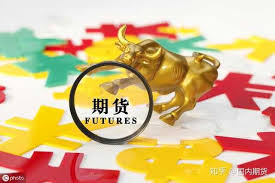
by APEX News | 2018-06-07

前言:2018年是中国改革开放40周年,也是1988年政府提出探索期货交易30周年。30载栉风沐雨,在一代一代期货人的坚守和奋斗下,我国期货市场从无到有,从小到大,从乱到治,从投机盛行到现在功能的逐步发挥、渐入佳境。“三十而立”,2018年,我国期货市场已经进入多元开放时代,不忘初心、砥砺前行。和讯期货特此以大型专题《三十而立 奋楫向前》致敬期货市场30周年。
谈到中国期货市场,鲜有人不知朱玉辰。
作为中国期货市场最早的开拓者和创始人之一,朱玉辰的功绩不胜枚举。他曾先后成功创办并经营管理了大连商品交易所和中国金融期货交易所。2018年,更是率中资企业首次出海创办新加坡亚太交易所,并担任首席执行官。
朱玉辰几乎将自己整个职业生涯都交付给了期货市场,是期货市场忠实的实践者。正如他本人所说,“我对期货市场有非常深厚的感情,我应该是在期货市场上坚持最久的人,是期货市场的创业者,也是中国期货市场30年发展的见证者。”
经济转型期的期货市场初探
朱玉辰与期货市场真正结缘,要从1989年说起。
1989年,朱玉辰作为中国第一人,前往美国芝加哥商业交易所(CME)和芝加哥期货交易所(CBOT)接受系统期货培训。当时,中国正处于价格改革的瓶颈期,“双轨制”暴露出很多问题。计划经济在向市场经济转化过程中出现了商品价格暴涨暴跌的现象,困扰和阻碍着中国经济的发展。
而当时在大洋彼岸,一些资本主义国家,已经能够很好的利用期货市场的套保功能来解决市场价格的波动,保证大宗商品市场的稳定。
朱玉辰在接受和讯期货采访时表示,80年代末,中国之所以开始研究期货市场,最大的一个动力就是来自于当时中国的“价格走向放开”,中国期货市场是解决市场价格波动的一次伟大探索。
据朱玉辰回忆,当时国外人对社会主义国家学习期货交易感到非常好奇,也引起了报纸、杂志的争相采访报道,尤其是那篇《北京烤鸭要上期货》的文章让其印象深刻。回国后,朱玉辰就开始从事期货市场的建设。“1990年开始,中国逐步发展期货交易所、建设期货公司,几年以后,中国期货市场初具规模,让美国人都非常震惊。”朱玉辰说。
30年期市发展的经验与教训
经过30年的探索实践,朱玉辰表示中国期货市场的发展取得了不错的成就。他指出,目前中国期货市场在成交规模、品种丰富度,以及对市场风险把控程度、服务产业的能力等方面,有了很好的进展。期货市场越来越渗透到行业的方方面面,他强调,产业对期货市场普遍处在学习和接受的过程当中,这是最大的成就。
与此同时,朱玉辰也总结了中国期货市场在30年发展中的一些经验教训。一是在90年代初期,由于监管不足,交易所如雨后春笋般破土而出,最多的时候达到50多家。交易所过多过乱、鱼龙混杂,造成了行业的无序、混乱发展,逼仓事件此起彼伏。后来,经过多年的清理整顿,特别是国务院把交易所并为3家以后,中国期货市场才真正走上了正轨。
二是从期货公司的角度来看,90年代初,非法期货在中国盛行,一些海外期货骗子在国内打着期货市场的名义诈骗,给期货市场带来了非常恶劣的负面影响。
期市发展进入下半场 国际化迈出新舞步
目前来看,我国期货市场在体量和质量上均取得了大的发展,商品期货成交量已连续8年位居世界第一。以开放促改革、促发展、促创新是中国经济发展的成功经验,期货市场也不例外。朱玉辰指出,尽管中国期货体量很大,但还是以国内交易为主,对国际市场影响有限,国际化程度还远远不够。
“经过30年的发展,中国期货市场发展的上半场已经走完,下半场的主要任务是如何走向国际,如何提高国际定价能力,把国内的成功变成一种国际的成功。”朱玉辰强调。
他表示,全球大宗商品的现货贸易中心已经转移到了亚洲,转移到了中国,中国铁矿石、大豆等大宗商品进口量已经占全球进口量的一半以上,同时,中国是全球石油、有色金属等商品的第一大买家。他认为,中国应该对国际定价产生直接的影响,应该具有定价能力,把中国期货市场的能量释放到国际市场中去。
对此,朱玉辰指出了三条国际化路径。首先,中国有条件的品种都应该国际化,让国际投资者参与进来。他指出,今年原油和铁矿石期货引入了境外投资者,这是一个行之有效的方法,这个步伐还应该加快。
其次,应该鼓励有能力的企业参与国际期货交易,到国际市场中去学习经验,在做好现货市场的同时学会利用期货工具提高国际竞争力。
此外,朱玉辰指出,走出国门去参股、建设海外交易所也是实现中国期货市场国际化的路径之一。例如中国参股巴基斯坦交易所和中欧国际交易所,以及成立新加坡亚太交易所。
“通过‘请进来 ’、‘走出去’来实现中国期货市场的国际化,两个方向相辅相成,互相构成了下一步中国期货市场走向国际舞台的宏伟蓝图。”朱玉辰说。
与国际接轨 打造离岸期货市场“试验田”
据悉,今年5月25日,新加坡亚太交易所(APEX)正式开盘交易,这是新加坡第三家交易所,也是中资企业在海外创办的首家离岸衍生品交易所。作为APEX创始人、CEO,朱玉辰表示,APEX利用离岸的方式来服务在岸市场,直接投入国际市场当中,为中国期货市场国际化“打前站”。APEX将充当中国期货市场国际化的一个“试验田”,配合国内四个交易所的国际化。
朱玉辰指出,目前亚洲的交易所大都属于国内交易所,而APEX从诞生就直面国际化,它将利用新加坡这样一个国际开放平台,建设一个直接和国际接轨的期货交易所,逐渐形成亚洲优势品种的定价中心。所以在上市品种的选择上,朱玉辰表示将主要围绕亚洲优势品种、中国进口量较大的品种,以及以人民币国际化为方向的相关品种。
朱玉辰表示,期货市场是中国市场经济发展的重要一部分,是中国改革开放40年历史中的一个缩影。中国期货市场的国际地位在提高,通过“双向开放”把中国市场的能量释放出去,中国期货市场的未来应该值得期待!
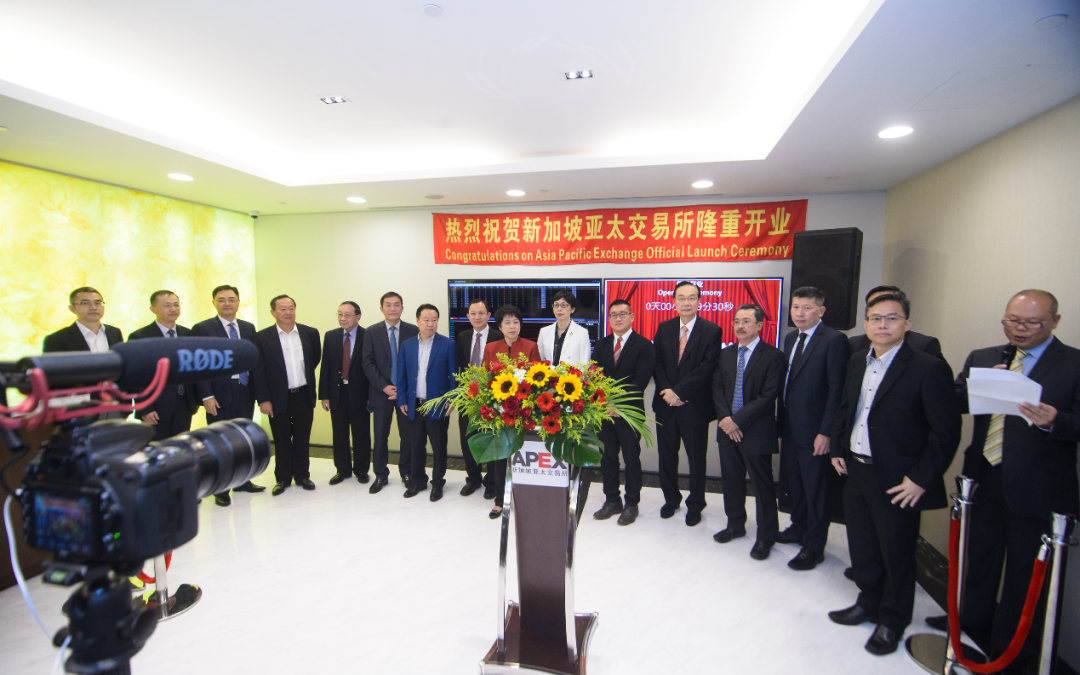
by APEX News | 2018-05-25
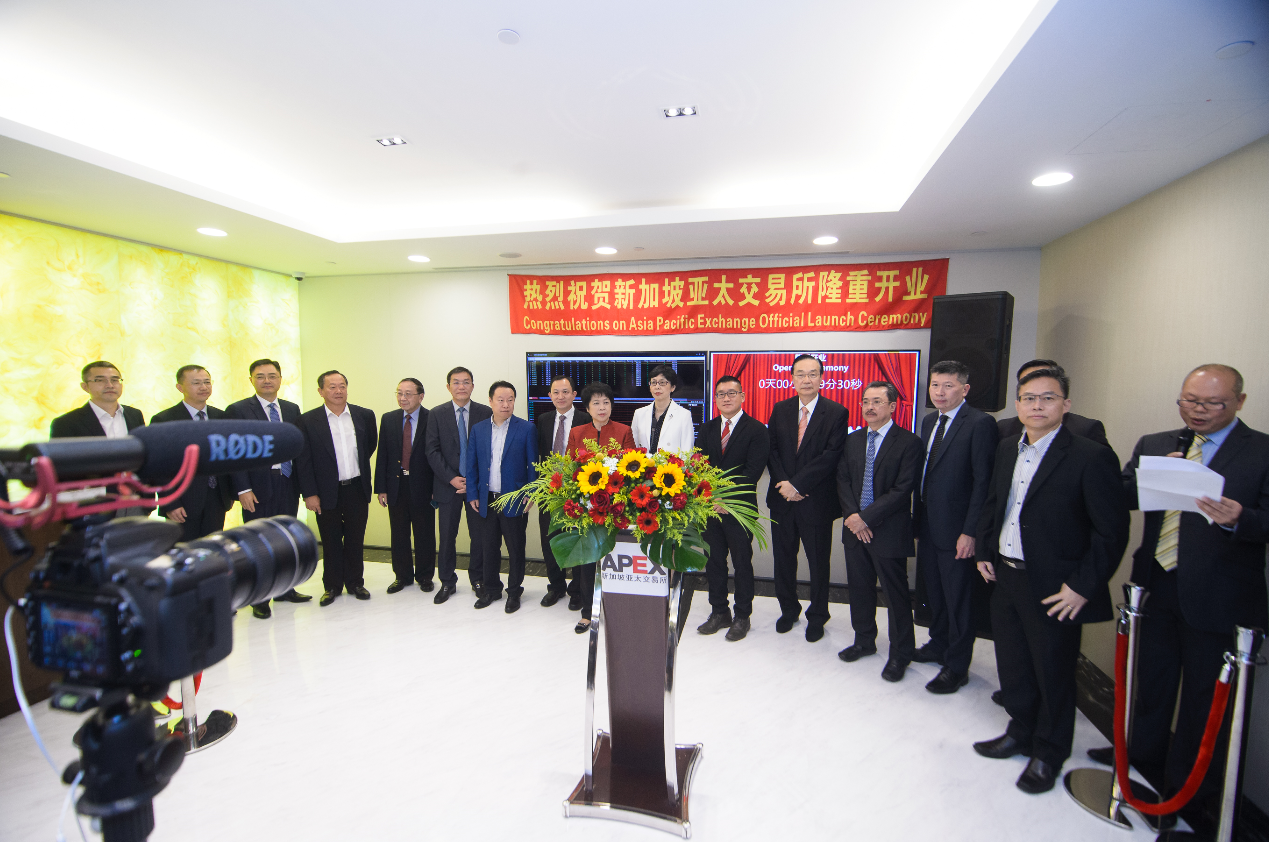
At 9am this morning, APEX, the third exchange in Singapore and the first overseas exchange backed by Chinese investors, officially opened for trading. Distinguished guest from the Monetary Authority of Singapore, IE Singapore, the Chinese Embassy in Singapore and other industry players were present to witness the opening ceremony.
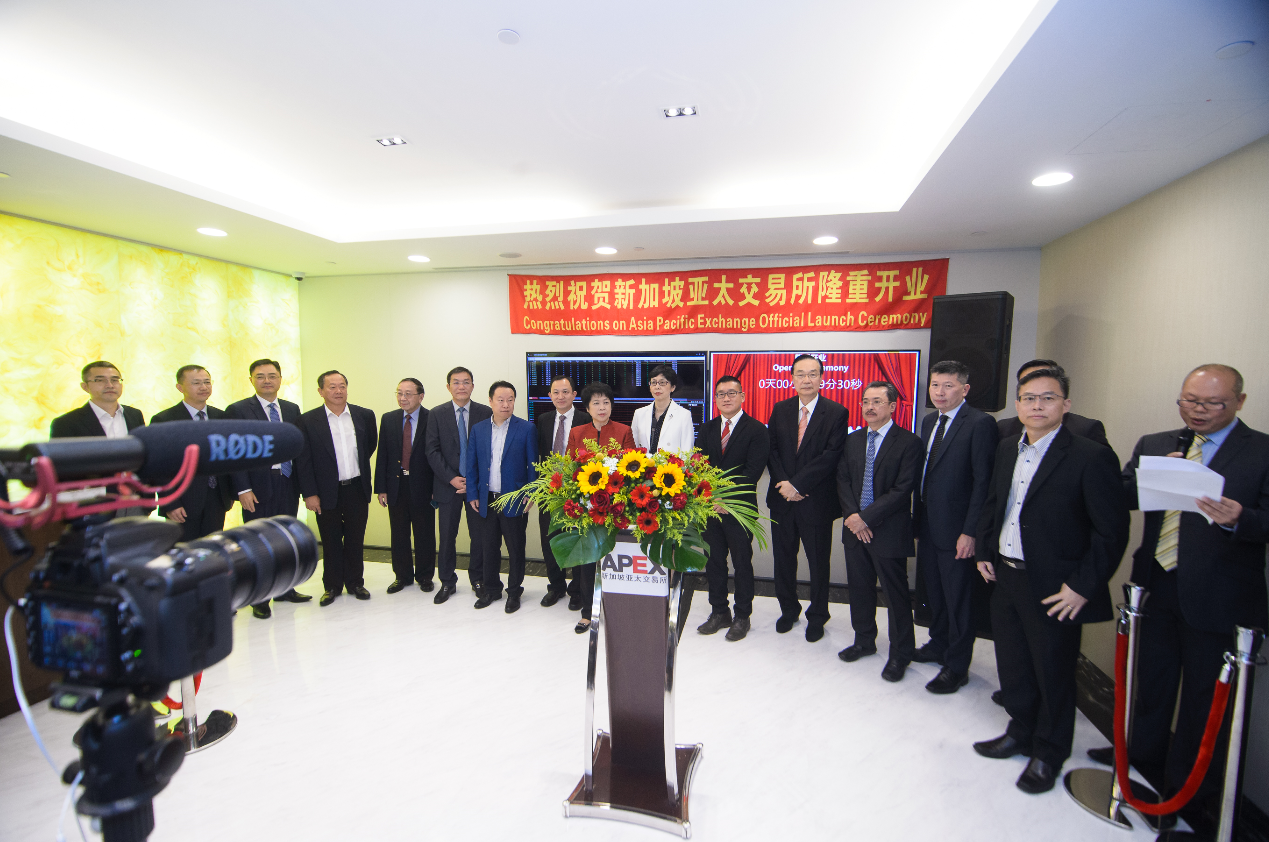
Stellar Performance on Launch Day
APEX has attracted many investors since the approval of its exchange license in February this year. The customer structure presents a broadly diversified portfolio, including palm oil traders, financial institutions, fund managers, and individual investors, forming a rich market ecosystem.
On its first trading day, APEX delivered and impressed the market with its stunning performance. The initial reference price for the first day of trade is US$638/MT for the first 6 contract months, and US$648/MT for the subsequent 6 monthly serial contract. As of 10am, the total volume traded was 3589 lots, with 1580 lots from PF1809 and 2009 lots from PF1811, and total open Interest was 258 lots. The opening price of the most active contract, PF1811, was 650 USD. The contract traded at a high of 665 USD, and a low of 640 USD.
APEX market data can be retrieved in real time through data terminals such as Bloomberg, Wind, WeHua, DZH and POBO, and can be viewed on APEX official website, www.asiapacificex.com.
Inaugural Contract Fills a Gap in the Palm Olein Market
For many years, the palm oil international trade has lacked an actively traded dollar-denominated palm oil futures product. Since international trade is mainly denominated in U.S. dollars, such a product will benefit palm oil producers and traders who would like to reduce exchange rate risks and currency conversion costs. At the same time, because palm oil is produced mainly in Malaysia and Indonesia, investors also expect that the physical delivery sites cover these two major producing countries.
The introduction of APEX palm olein contract solved many problems faced by current market players in terms of currency risk and the settlement process. APEX’s palm olein futures contract is denominated in US dollars, putting it in line with the international trade settlement currency for spot palm olein. This avoids exchange rate risks from currency conversion, thus providing a more direct and effective price discovery mechanism. The product that will go for delivery is RBD palm olein, the most common variety used in international trade. The designated port of delivery is located in the main production areas of Indonesia and Malay on both sides of the Malacca Strait, two countries with abundant palm oil resources and comprehensive port and refining facilities. The contract also adopts FOB delivery for physical settlement, which reduces storage costs and saves on delivery costs, thus making the delivery process more convenient for buyers and sellers alike.
CEO of Philips Futures Mr Teyu Che Chern said that APEX’s refined palm olein futures contract has garnered a lot of attention from participants in the palm industry and among trading firms. He believes that APEX will attract a more diverse range of participants in the future, further promoting liquidity and improving the price discovery function of the futures market, and eventually building a commodity price benchmarks in Asia.
Mr Alex Tan from AAA Oils & Fats Pte Ltd expressed his full recognition of the innovative nature of APEX palm olein futures contract. He said “APEX has provided an all-inclusive solution for physical delivery to meet the complex needs of industrial customers. Both upstream and downstream businesses in the supply chain can use APEX palm olein futures contracts as an effective pricing benchmark to achieve better operational management. The international palm oil commodity market will also have a new risk management tool to manage business risk.”
Improved arbitrage opportunities
Through APEX, market participants are provided with greater cross-market and cross-variety arbitrage opportunities. Since APEX’s trading hours cover both the Dalian Stock Exchange and Bursa Malaysia, investors will find more investment arbitrage opportunities across the different markets. Given the strong price correlation between palm oil, soybeans, and crude oil prices, there are also many opportunities for arbitrage between the different edible oils.
With the current Sino-U.S. trade tension, APEX dollar-denominated palm olein contract, whose underlying is a highly substitutable product to soybean oil, also provides hedge funds a good hedging tool to manage risk in their soybean trades.
Build an Asian price benchmark
Year 2018 marks the 40th anniversary of China’s reform and its opening to the global economy, and China-Singapore relations have advanced along the way. Under the “One Belt One Road” initiative, China-Singapore economic and trade cooperation has progressed, and both countries have benefited from their continual cooperation. Being the first international exchange opened by Chinese investors, APEX is the latest and most prominent project in the area of China-Singapore economic and trade cooperation.
As mentioned by Mr Zhu YuChen, founder and CEO of APEX, 4 billion of the world’s 7 billion people are now in Asia, and Asia is currently contributing to almost 60% of global economic growth. He believes that the global international economic and trade centre is migrating to Asia, and with more than half of the world’s bulk commodity consumption occurs in this region, Asia should become one of main global trading venues. The vision of APEX is to establish a benchmark for commodity prices in Asia, and to build an Asian commodity and financial derivatives trading centre.
APEX has chosen Singapore to set up its business for various reasons. Firstly, Singapore is Asia’s most open international financial centre, and is located at the crossroads of international commodity trades. Next, many multinational commodity companies have located their headquarters in Singapore, forming a well-developed OTC derivatives market. In addition, Singapore has an open business environment, emphasis on the rule of law, a large pool of high quality talents, and is an important trade hub for round the clock trades between New York and London. APEX intends to take advantage of its inherent advantages and Singapore’s geographical location to make positive contributions and to promote economic development and industrial prosperity in the Asia Pacific region.
APEX clearing members are established brokers located in the South East Asia and Greater China region, including Phillip Futures, KGI Securities, UOB Bullion and Futures, UOB Kay Hian, HGNH International Financial, DA Financial Services and Straits Financial Services. Clearing banks comprise of internationally recognised banks, including Standard Chartered Bank, Bank of China, Industrial and Commercial Bank of China, and DBS Bank.
After the successful launch of its first product, APEX will subsequently introduce other futures contracts, including agricultural, energy, metal, foreign exchange, and index futures.






